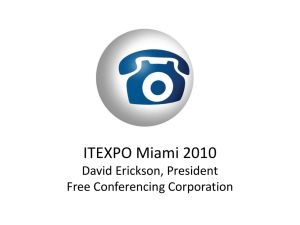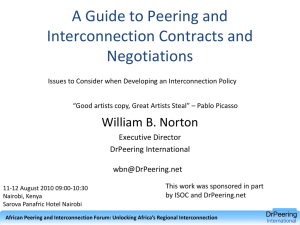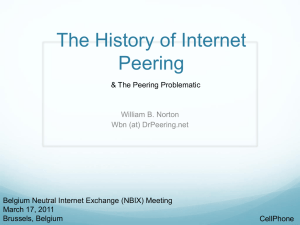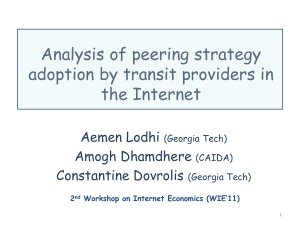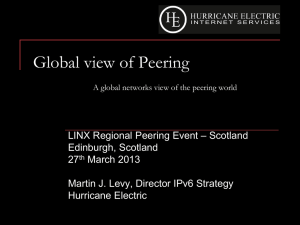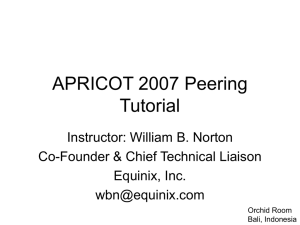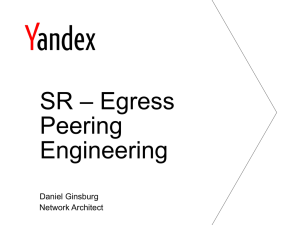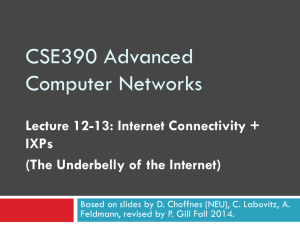A Business Case for Peering in 2010
advertisement
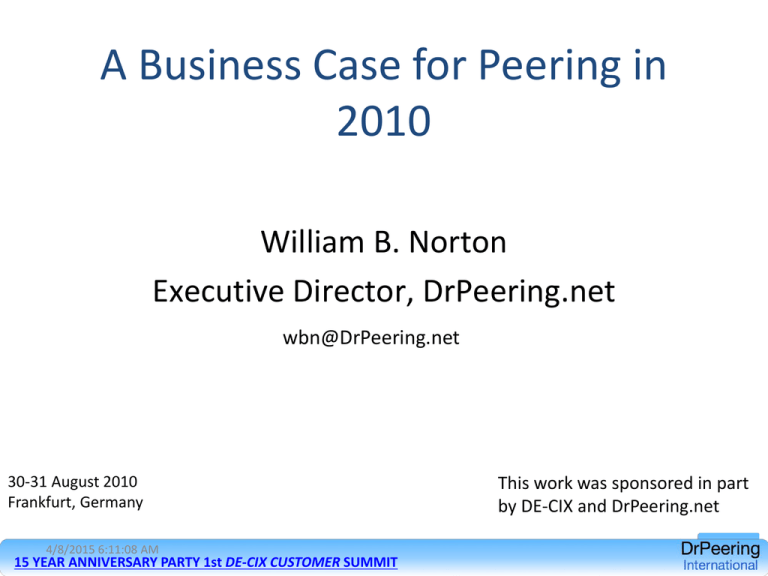
A Business Case for Peering in 2010 William B. Norton Executive Director, DrPeering.net wbn@DrPeering.net 30-31 August 2010 Frankfurt, Germany 4/8/2015 6:11:08 AM 15 YEAR ANNIVERSARY PARTY 1st DE-CIX CUSTOMER SUMMIT This work was sponsored in part by DE-CIX and DrPeering.net Background 1987 – building Internet Ops community 1998 – building Peering Intelligence 2008 – consulting, education DrPeering.net Peering Resources • • • • • • • • • • • • • Internet Service Providers and Peering A Business Case for Peering About the White Paper Process The Art of Peering - The Peering Playbook The Art of Peering - The IX Playbook Chief Technical Liaison Ecosystems: 95th Percentile Measurement for Internet Transit Asia Pacific Peering Guidebook Evolution of the U.S. Peering Emerging Video Internet Ecosystems European vs US Internet Exchange Points Internet DataCenter Build vs Buy Decision Internet Service Providers and Peering All freely available • • • • • • • • • • • • Internet Transit Pricing Historical and Projections Modeling the value of an Internet Exchange Point NANOG History Peering: Motivations to Peer A Study of 28 Peering Policies Peering Simulation Game Peering: Top 10 Ways to Contact Peering Coordinators Peering: Top 10 Reasons NOT to peer Public vs Private Peering - the Great Debate The Folly of Peering Ratios Top 9 IX Selection Criteria Video Internet - The Next Wave of Massive Disruption to the U.S. Peering Ecosystem This is how I level set INTERNET TRANSIT Definition of Transit Definition: Internet Transit is the business relationship whereby one ISP provides (usually sells) access to all destinations in its routing table Simple Well defined No netops req’d Traffic flows opposite direction of routing announcements 95th% 95th Percentile P Internet Transit Declines Noone makes $ Can’t go down trend Market Prices for Transit Source: http://drpeering.net/white-papers/Internet-Transit-Pricing-Historical-And-Projected.php Good news – Traffic always grows P60%V80% Group: What happens at $0/Mbps? • BrainStorm – shout out – Tell me how a content distribution business can make money when – The transit price is $0/Mbps AFTER INTERNET TRANSIT DOES PEERING MAKE SENSE ANYMORE? Analysis of Traffic Flow Vs.direct Analysis of Traffic Flow Def.P Definition of Peering Definition: Internet Peering is the business relationship whereby companies reciprocally provide access to each others’ customers. Peering is not a perfect substitute for transit, & is not transitive. Back to traffic flow… Analysis of Traffic Flow Top50 Peering Top 50 Histogram http://drpeering.net/forms/peering-top-fifty-list.xlsx Cost Cost of Peering Peering is NOT FREE 1) Transport Fees 2) Colocation Fees 3) Peering (Port,membership,etc) Fees 4) Routing equipment #s Cost of Peering $8000/mo $6000/mo $2000/mo Plug some #’s in 1) 10G Transport Fees: $6K/mo 2) Colocation Fees: $1K/mo Colo $1000/mo 3) Peering (10GPort,membership,etc) Fees: $2K/mo Alternative to Peering: Transit at $5/Mbps 4) Routing equipment: $8K/mo How do we compare peering and transit? Total Cost of Peering: $17K/mo Can peer ~ 7Gbps (for free) = $17K/7000=$2.43/Mbps best case scenario 1M,2M,3M Peering Cost $17K/month Peering Cost in $/Mbps Exchanged $180.00 $160.00 $140.00 $120.00 $100.00 $80.00 $60.00 $40.00 $20.00 $0.00 100 200 300 400 500 600 700 800 900 1000 1100 1200 1300 1400 1500 1600 1700 Peering Metrics Effective Peering Bandwidth / Minimum Cost of Traffic Exchange Peering Cost in $/Mbps Exchanged $180.00 $160.00 $140.00 costOfPeering effectivePeeringBW $17KperMonth minim um CostOfTrafficExchange $2.34/ Mbps 7000Mbp minim um CostOfTrafficExchange $120.00 $100.00 $80.00 $60.00 Minimum Cost of Traffic Exchange=$2.34/Mbps $40.00 $20.00 6900 6700 6500 6300 6100 5900 5700 5500 5300 5100 4900 4700 4500 4300 4100 3900 3700 3500 3300 3100 2900 2700 2500 2300 2100 1900 1700 1500 1300 1100 900 700 500 300 100 $0.00 Effective Peering Bandwidth=7000Mbps Peering Break Even Point $180.00 $160.00 costOfPeering priceOfTransit $17,000perMonth peeringBreakEvenPo int $5 perMbps peeringBreakEvenPo int 3400Mbps peeringBreakEvenPo int $140.00 $120.00 $100.00 $80.00 Peering Break Even Point $60.00 $40.00 $2.34/Mbps $20.00 Transit@$5/Mbps 6900 6700 6500 6300 6100 5900 5700 5500 5300 5100 4900 4700 4500 4300 4100 3900 3700 3500 3300 3100 2900 2700 2500 2300 2100 1900 1700 1500 1300 1100 900 700 500 300 100 $0.00 Range… Effective Peering Range $180.00 $160.00 effectivePeeringBandwidth range( peeringBreakEvenPo int,effectivePeeringBandwidth ) effectivePeeringBandwidth $17K range(3.4Gbps,7Gbps) $140.00 $120.00 $100.00 $80.00 Peering Break Even Point $60.00 $40.00 $2.34/Mbps $20.00 Transit@$5/Mbps 6900 6700 6500 6300 6100 5900 5700 5500 5300 5100 4900 4700 4500 4300 4100 3900 3700 3500 3300 3100 2900 2700 2500 2300 2100 1900 1700 1500 1300 1100 900 700 500 300 100 $0.00 Effective Peering Bandwidth Generalized Peering Break Even Point Minimum Cost of Traffic Exchange Effective Peering Range Effective Peering Bandwidth Peering Metrics The Business Case for Peering in 2010 Frankfurt Madrid Budapest Value Of an Internet Exchange Assume that the next best alternative to peering at DECIX is transit At $2/Mbps. valueOfDECIX m bpsExchanged* avgTransitPrice valueOfDECIX2010 1000000* $2 / Mbps valueOfDECIX2010 $2,000,000perMonth If the DECIX were to disappear tomorrow, the peering population would be $2M per month worse off. The DE-CIX is very valuable to the peering population there. TOP TEN LISTS Top Top Top10 10 n Lists Lists Why Peer? Why not Peer? Top 10 ways seasoned Peering Coordinators Contact Target ISPs Top 4 Motivations to Peer ① Lower Transit Costs ② Lower Latency ③ Usage-based traffic billing ④ Marketing Benefits Top 10 Reasons NOT to Peer ① ② ③ ④ ⑤ ⑥ ⑦ ⑧ ⑨ ⑩ Traffic Asymmetry Transit Sales Preferred Ports are for Revenue Keep Transit Prices from sliding Prefer SLAs Traffic Ratio denial Transit is Cheaper Personality Conflicts We aren’t true Peers We don’t have the cycles Top 10 ways to contact Peers ① ② ③ ④ ⑤ ⑥ ⑦ ⑧ ⑨ ⑩ face-to-face at informal meeting in an Internet Operations forum like NANOG, IETF, RIPE, GPF, APNIC, AFNOG, etc., face-to-face at Commercial Peering Forums like Global Peering Forum (you must be a customer of one of the sponsoring IXes) face-to-face at IX Member Meetings like DECIX, LINX, or AMS-IX member meetings. introductions through an IX Chief Technical Liaison or a peer that knows the right contacts via electronic mail, using the pseudo standard peering@ispdomain.net or a personal contact, from contacts listed on an exchange point participant list, or peeringdb registrations, with tech-c or admin-c from DNS or ASN registries, Google for peering contact AS peering , from the target ISP sales force, at trade show or as part of sales process, from the target ISP NOC. Top 9 IX Selection Criteria ① Telecommunications Issues ② Deployment Issues ③ ISP Current Presences ④ Operations Issues ⑤ Business Issues ⑥ Cost Issues ⑦ Credibility Issues ⑧ Exchange Population Issues ⑨ Existing Exchange vs. New Exchange? Q&A Will this in a document form help you make the internal case for peering? What would appeal to your team?
